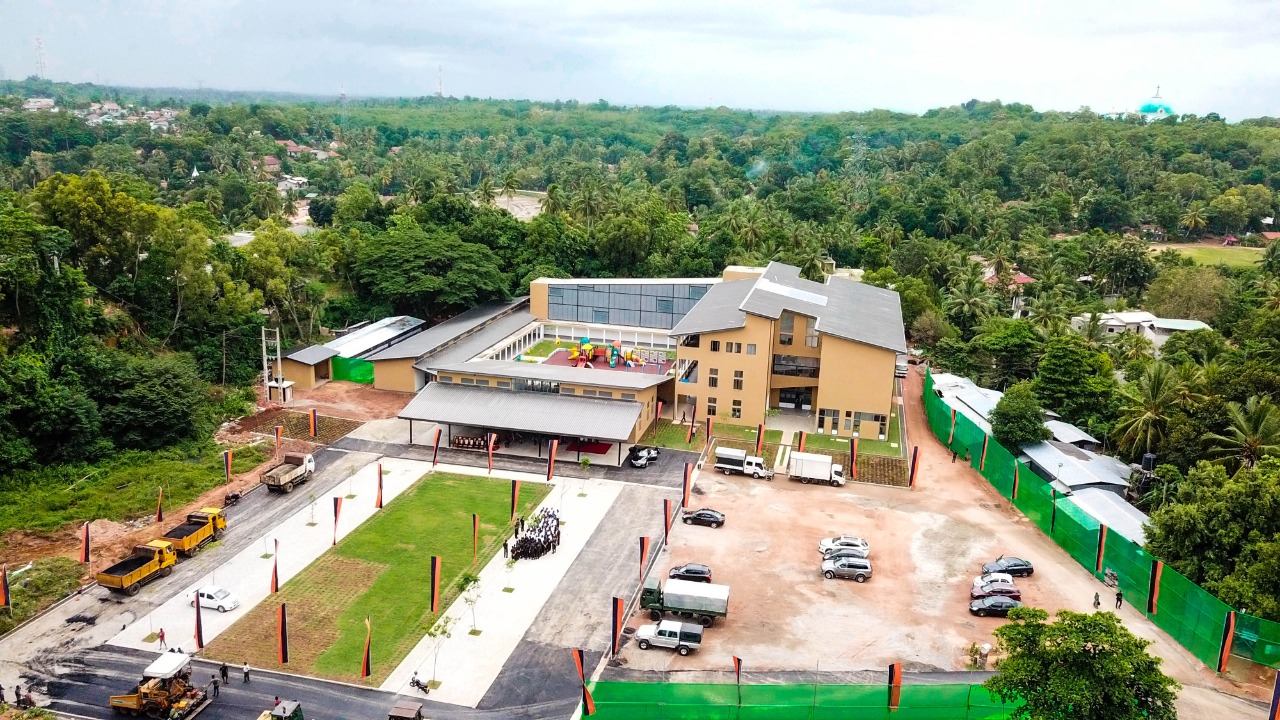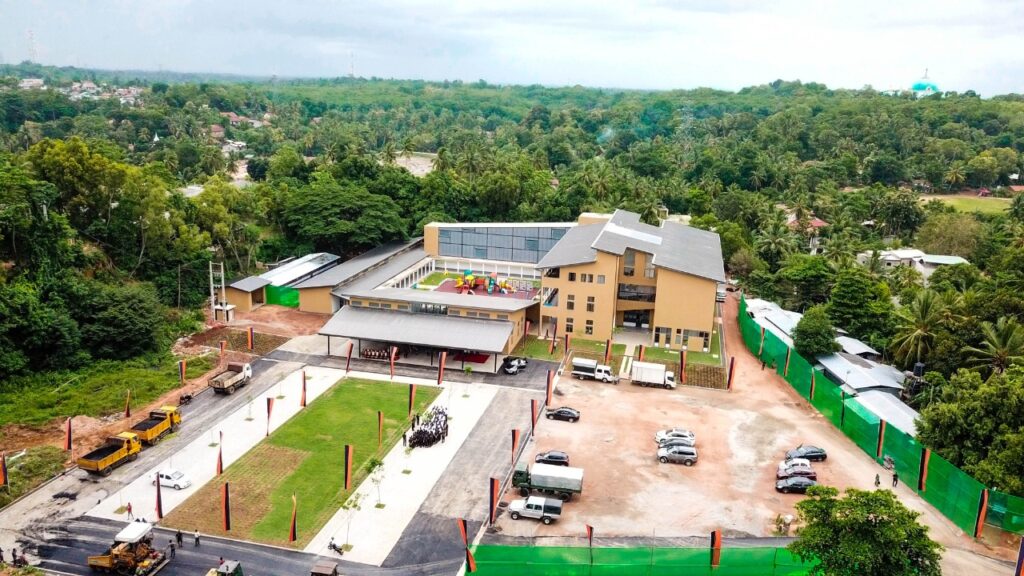It is the same old story everywhere… of special children being shunned by the general community that has little or no knowledge or understanding of disabilities. Sri Lanka is no exception; and a few years ago, Rotarians in Sri Lanka decided to partner with the Sri Lankan government, its Army, medical and educational institutions and large corporates to support a unique project for special children.

This mega partnership has resulted in a colourful, vibrant, efficient, well-manned and sprawling facility for children with both mental and physical disabilities, aptly named Ayathi (Sanskrit for ‘hope’). A charitable trust established through joint collaboration between the University of Colombo, Hemas Holdings, MAS Holdings (both blue chip business conglomerates in Sri Lanka) and Rotary Sri Lanka, this hi-tech spanking new facility is gearing up to provide a wide range of diagnostic, intervention and treatment facilities for special children.
During his recent visit to Colombo, RI President Mark Maloney inaugurated the well-equipped acoustics centre at the Ayathi complex funded by a TRF global grant done by RC Colombo West.
Rotary can help in a big way in running social campaigns to eradicate the stigma associated with disability.
– Shiromi Masakorala, Executive Director, Ayathi Trust
Giving details of the entire project, incoming Trustee Chair K R Ravindran explained that this $3 million centre “spread across a two-acre land area and with a 42,000sqft built up space will provide services free of charge and is expected to be one of the finest such centres in South Asia.”
The University of Colombo made available the land. The Sri Lanka Army built the premises in 13 months with two major cash infusions of $600,000 each from Hemas and MAS Holdings. “Both these companies have members of Rotary on their main board. Rotary Colombo West made available equipment with TRF global grants valued at about $400,000 with DDF support from districts in India and the US,” he said.

The Faculty of Medicine, of the University, would absorb all the operational and maintenance costs. It will provide trained professionals in the field of disability studies. The areas covered extend to all disabilities (physical and mental) with initial screening and intervention that will include Speech and Language Therapy, Audiology, Physiotherapy, Family Therapy, Occupational Therapy etc. It will also provide the support and guidance for parents and caregivers. The centre already has registered outdoor patients (children) nationwide numbering over 5,000, added Ravindran.
Shiromi Masakorala, executive director of the Ayathi Trust, said that there is a huge need in the country for treating “children with disabilities, training them and giving them vocational skills in order to make them useful and productive members of society.”
Here is a great example of Rotary connecting different organisations to come up with an outstanding centre for children with disabilities.
– Mark Maloney, Rotary International President
Reeling off statistics, she said that when the whole idea of setting up such a facility came up in 2016, “we did a comprehensive survey and found that about 20 per cent of children in Sri Lanka — that is one child in every five — have some form of disability or another. Globally 2 to 5 per cent of children have cerebral palsy; and 18 per cent have dyslexia. In Sri Lanka, most often they don’t know what dyslexia is, and the child would be either isolated or branded as not-so-brainy, or a slow learner and sidelined.”
If such children can be identified at an early age and the right intervention and training given to them, they can be integrated into mainstream society and even regular schools. “Our aim is to do such integration; at this centre, kids will be referred from various places in the country, evaluated by a multi-disciplinary team of experts at day clinics, given appropriate intervention and vocational training specially designed for children with disabilities. The assessment will be done by specialist paediatricians and the intervention required will be given.”
The best part about this modern, state-of-the-art facility filled with fun play material for children is that even though it comes under the umbrella of the faculty of medicine, “it is not within a hospital, but a community setting, so the children don’t feel like they are sick or are patients. And here we can deal with a multitude of disabilities to make the children functionally optimal,” she added.

As the team of senior RI leaders went around the facility, with the experts explaining the various technical details of the different training functions available, Gay Maloney could be seen reaching out to the children, chatting and playing with them.
Shiromi added that the biggest challenge in integrating these children into mainstream society is the huge stigma attached to disability, “not only in Sri Lanka or Asia but even the most developed countries in the world.” On the one hand, while there is a shortage of trained professionals to deal adequately with special children, on the other hand “there is a lack of support system for the caregivers, parents and teachers. And then there is the negativity; when a child is born with a disability, the parents and the entire family become hopeless, helpless, start spending money on all kinds of things. To give hope to such parents/caregivers we have named our trust Ayathi.”
Going forward, the Ayathi Board wants to ensure that this facility not only becomes a world class centre of excellence but is also sustainable in the long term, and hence the importance of public and private partnerships. Also, the Ministry of Health is planning to take this concept to other teaching hospitals. A residential centre is also being planned as this centre gets referrals from all over Sri Lanka.

Inaugurating the well-equipped Audiology Centre donated by Rotary, RI President Maloney said, “Here is a great example of Rotary connecting different organisations with Rotarians of the world to come up with an outstanding world class centre for children with disabilities. What a proud day for Rotary.”
PRIP Ravindran added that this was the type of projects that “the new projects of scale to be launched by TRF next year will try to emulate. This programme will challenge Rotary clubs to think big and approach co-partners and sponsors to join them in a comprehensive solution to major issues, the benefits of which will reach a large section of population. In this case the whole country will be served.”
Later, President Maloney also visited a Human Heart Valve and Tissue Bank, set up by RC Colombo Fort through a global grant, at the Lady Ridgeway Hospital in Colombo. Here human heart valves are harvested and stored and used for operating on children with defective heart valves. Here the cardiologists explained to the visitors that while artificial heart valves or those taken from animals can also be used, “these valves can get calcified fast, whereas those taken from humans last longer, and where available, these are the first preference anywhere in the world.”

Such valves have to be harvested from cadavers within 24 hours of death and even adult valves can be used in children. “These can be stored at this bank for a year at a very cold temperature; at present we have four usable heart valves. Not all harvested valves can be used; we have to do a culture to make sure there are no organisms in the valve. At the slightest suspicion we reject the valve,” explained a doctor.
But the good thing about Sri Lanka is “Sri Lankans donate their organs without hesitation; we haven’t had a single issue of people refusing to donate.”
Pictures by Rasheeda Bhagat
Stigma attached to disability
To give the audience an idea of the level of stigma attached to disability, Shiromi Masakorala, executive director of the Ayathi Trust, who is a child psychologist as well, relates a few heartbreaking stories. In preparation for setting up this facility, she did an awareness “programme deep down in South Sri Lanka, and while delivering the vote of thanks, one mother said: ‘Every mother wants her child to live for 400 years but I want my child to die one hour before I die.’”
Her company, Hemas Holdings, a major donor to Ayathi, runs playschools for children and one of the mothers told them: “I carry my son 3 km to bring him to your centre. Still the bus doesn’t stop because my son looks ‘evil’… it is a bad omen for everyone to see him in the morning. But for me he is the most treasured gem…”
Another mother told her, looking at her disabled little daughter: “I had so many dreams when I conceived you my little girl… that was only a dream and you have come to this world to pay for your sins. But whatever you may be, I will love you and care for you; unfortunately your father and his family left us to fend for ourselves. But I will be with you till death parts us.”
On one occasion, Shiromi added, she found a child tied to a tree with a chain near a river, while the mother worked close by. “So I asked the mother and she said my family has left us because my child has a mental illness, so I have to work to support both of us. But I can’t leave him free, because there is nobody to watch him and he might jump into the river, so I have no other option but to tie him to the tree. Can you imagine this?”
Also, at their playschools, they find often that if a disabled child is admitted, other parents take away their children. This is the level of stigma attached to disability.
So apart from giving money to Ayathi, how can Rotarians help, I ask her. “Oh, they can help in a big way in running social campaigns to eradicate the stigma associated with disability. After all, they eradicated polio from Sri Lanka, and can surely help this cause in a big way,” she responds.






